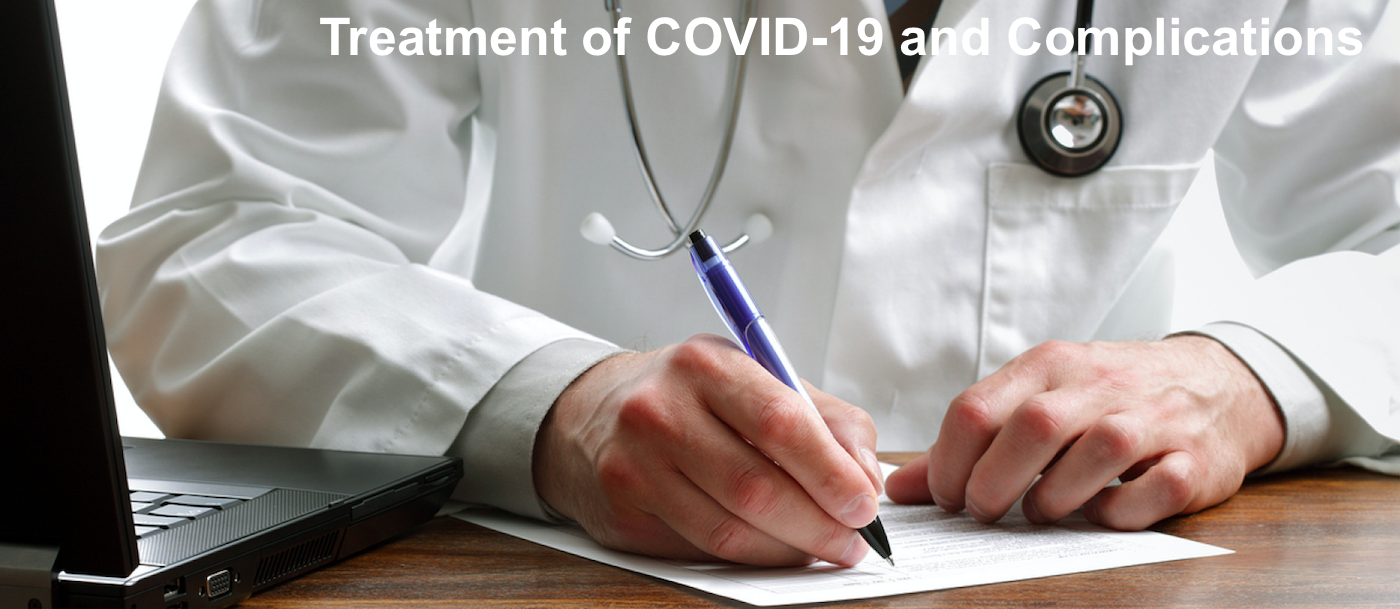Published March 12, 2021, 12:00 am
Treatment of COVID-19 and Complications
Treatment of COVID-19 and complications
New infection with the coronavirus has not been cured yet. However, There are different vaccines of varying efficacy available to the public.
The FDA approved its first treatment for COVID-19, remedesivir, on 22 October 2020. It is prescribed for individuals 12 years old and older who have been admitted to the hospital. It is given in the form of an intravenous infusion (IV).
In November 2020, the FDA also awarded monoclonal antibody medicines to EUAs (emergency use authorisation). Monoclonal antibodies are human proteins that help combat substances such as viruses that are produced in foreign countries.
These medications are:
● Bamlanivimab, from Eli Lilly
● Imdevimab and casirivimab, from Regeneron Pharmaceuticals, must be administered together.
They are also given through an IV infusion, such as Remedesivir, and are intended for 12 years of age and older. These medications are used for ambulatory or outpatient care.
EUAs (emergency use authorization) for a few other treatments intended for people at high risk of hospitalization, such as convalescent plasma, was also issued by the FDA.
During the course of the virus, the majority of COVID-19 therapy focuses on symptom management.
If you think that you have COVID-19, look for medical assistance. Your doctor will advise you on treatment for any symptoms or complications that may develop and tell you if emergency treatment is required.
When to see your doctor
If you think you have symptoms of COVID-19 or notice them, speak to your doctor immediately. Your doctor will tell you if you should:
● Stay at home and evaluate your symptoms.
● Establish a visit to telehealth
● Come to the doctor's office for assessment.
● For more urgent care, go to the hospital.
Treatments for other coronaviruses
Other coronaviruses, such as severe acute respiratory syndrome and the Middle East respiratory syndrome, are also used for symptom management (MERS). The effectiveness of experimental treatments has been tested in some instances.
Examples of therapies used for these illnesses include:
● Retroviral or antiviral medications
● BPT (blood plasma transfusions)
● Steroids for reducing inflammation and swelling of lungs
● Breathing support, including mechanical ventilation
What are the possible complications from COVID-19?
Pneumonia, referred to as the new coronavirus-infected pneumonia in 2019, is the most severe complication of COVID-19(NCIP).
A study of 138 people with NCIP in Wuhan in 2020 found that 26 percent of people admitted to the ICU had severe cases and needed treatment.
The proportion of individuals who died of NCIP following hospital admission was 4.3 percent. It should be noted that, on average, people who have been admitted to the ICU are older than those who have not been admitted to the ICU and have more basic health conditions. The only complication specifically associated with the 2019 coronavirus is not NCIP (novel coronavirus-infected pneumonia). Researchers have noted the following complications in individuals who develop COVID-19:
● PMIS pediatric multisystem inflammatory syndrome is also called MIS-C (a multisystem inflammatory syndrome in children).
● ARDS (acute respiratory distress syndrome)
● Heart attack or MI (myocardial infarction)
● Fatigue
● Severe muscle spasm or pain
● Arrhythmia (irregular heartbeats)
● Kidney failure or kidney injury (including dialysis)
● Cardiovascular shock
How can you prevent coronaviruses?
The best way to prevent the transmission of the virus is to avoid or limit contact with individuals with COVID-19 symptoms or respiratory infections.
The next best thing you can do is practice good hygiene and social distance to prevent bacteria and viruses' transmission.
Prevention tips
● Wash your hands frequently with warm water and soap for at least 20 seconds at a time. How long is 20 seconds? Approximately the time it takes to sing your “ABC’s”
● When your hands are dirty, do not touch your face, eyes, nose, or mouth.
● Do not go out if you feel sick or have any symptoms of cold or influenza.
● Stay 6 feet away from human beings at least (2 meters). Avoid large gatherings.
● Bring a tissue or the inside of your elbow to your mouth whenever you sneeze or cough. Dispose of any used tissue immediately.
● On objects such as telephones, computers, and doorknobs, use disinfectants. Use soap and water for items like utensils and dishes that you are cooking or eating with.
Different types of vaccines are available for the public now. Some have already shown their effectiveness in clinical trials.
The FDA granted its first vaccine to the EUA on 11 December 2020. Pfizer and BioNTech have been developing this vaccine. Individuals aged 16 or older can be given this. On 18 December, the FDA awarded a modern vaccine to the EUA. The Moderna vaccine may be given to individuals aged 18 or older.
Conclusion:
● First and foremost, do not be worried. Unless you have a confirmed test result or suspect you have contracted the virus, you do not need to be quarantined.
● Simple handwashing and physical separation guidelines are the most effective ways to avoid being infected with the virus.
● When you hear about new deaths, quarantines, and travel bans, the 2019 coronavirus may seem frightening.
● If you've been diagnosed with COVID-19, stay calm and follow your doctor's instructions to recover and help prevent the new coronavirus from spreading.
References:
6. MD, D. W. (2020, February 07). Clinical Characteristics of 138 Hospitalized Patients With 2019 Novel Coronavirus–Infected Pneumonia in Wuhan, China. JAMA, 323(11), 1061-1069. 10.1001/jama.2020.1585
